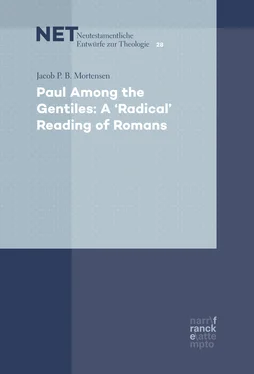The significance of προσωποποιία – literature and life, or rhetoric and realism
From the observations discussed above, I find it difficult to overestimate the importance of the persuasive persona of the imaginary interlocutor that Paul constructs through the literary device of προσωποποιία. This persuasive mask that Paul constructs and shapes, informs the letter in such a way that it has a deliberate and calculated effect on the addressees in the specific and final paraenesis (Rom 14–15). In short, Paul applies the rhetorical device of προσωποποιία for a reason. All the elements Paul brings into play (background, emotions, history, concerns, ethnicity, religion, status, etc.) cumulatively contribute to the calculated creation of a persuasive persona and character. The language may sometimes reflect an artificial, exaggerated, or rhetorical position of enunciation, as though uttered from a stereotypical (Jewish) worldview, without the warmth of actual flesh and blood. The convincing and realistic tone may be lacking at times, but there is sufficient realism in the presentation to win our sympathy. At times the language may be monotonous, and may border on the excessively rhetorical, but it is equally clear and soothing. It may also be artificial. But in 7:7–25, the very artificiality of the passage bestows on it a lasting quality, and it realizes the message. Consequently, what may be lost by reason of its being a ‘stereotype on steroids’, in language removed from ordinary life, is gained from the pleasant style. Thus, we should evaluate Paul’s use of προσωποποιία based on its communication of a certain message and presentation of a certain ethnic, religious, and social person. Even more importantly than this, we should not feel forced to choose between literature and life, between rhetoric and realism. We may enjoy a ‘speech-in-character’ as a clever and brilliant treatment of a (literary, ethical, religious, ethnic) theme enriched with enough of the human touch to suggest to the reader the illusion of an actual individual. Paul’s stereotypical, religio-ethnic persona no doubt interests us as a literary figure. But even this characterization possesses qualities that give him a semblance of realism: The religio-ethnic Gentile is cocksure, boastful, calculating, impenitent, arrogant, bookish, double-tongued, a braggart, a windbag, and a wiseacre (cf. 2:1–24; 7:7–8:2). He is such a complete failure that he becomes untrustworthy and exaggerated, as did the stereotypical account of the Gentiles in 1:18–32, who did not just do one tiny thing wrong, but did everything wrong. At the same time he is also dedicated, interested, devoted, understanding, remorseful, penitent, happy, and overexcited (3:1–9; 7:7–8:2). Thus, we find it easier to identify with him. This also means that his literary and rhetorical persona reaches beyond the confines of the textual borders, and all these rhetorical and realistic features help Paul to communicate his message.
As a final consideration, we may evaluate the ‘actual’ speech-in-character in 7:7–8:2. This is a highly rhetorical piece, both in its ostensible persuasiveness, and in its mode of expression. This follows naturally from the fundamental purpose of communication: Paul demonstrates and comments on a certain way in which his letter as a text can negotiate relationships, and mediate between writer and reader, concerning the difficult question of identity. He presents two different perspectives – his own and the Gentile interlocutor’s – and facilitates a fictive dialogue. Thus, the purpose is revealed as not merely persuasion, but also the engendering of a response from, and a sense of identification in the addressees. Consequently, Paul combines rhetoric with confession, in order to create a persuasive paraenesis (cf. Rom 12–15); he frames the experiences of the addressees – actual, stereotypical, or exaggerated – through the devices of rhetoric and confession, in order to achieve his interventional goal in the paraenetic part of the letter. At the general level of discourse, he combines persuasion and paraenesis – the fundamentals of deliberative rhetoric. He presents them as synonymous processes, or as cumulative and consecutive processes. And as a paraenetic text with an overtly persuasive agenda, Romans establishes this overlap as it achieves persuasive paraenesis at the personal (confessional) level of the encoded reader/audience (in 7:7–25), and also (and more importantly) at the level of the actual, historical, Roman addressees.
5 Romans 1:18–32
Introduction
So far, I have stated that, in Romans, Paul explains his gospel to Gentile believers in Christ, in order to equip these Gentiles not to pursue a full or normal Jewish life with circumcision and observance of the law as their mode of entry into God’s covenant with Israel. Should they pursue such a life, they would mistrust and betray their Gentile status as members of the family of Israel, and they would have misunderstood the purpose and efficacy of Christ’s sacrifice on their behalf. In this chapter, I will begin to move forward through the text of Romans (progressively) in order to substantiate these claims.
Throughout chapters 2–11, Paul presents an interlocutor who appears as a fictive Gentile who takes great interest in boasting of his Jewishness – except in 7:7–25. The Gentile interlocutor supposes that literal circumcision and observance of the law1 are obligatory entry requirements for being a member of the family of Israel, and for becoming an heir of Abraham. However, as Paul’s argument unfolds it becomes clear that Paul does not argue against Judaism, as traditional scholarship has it. Paul argues about Judaism – specifically how a Gentile as a Gentile gains entry into the family of Israel in the wake of Christ. Thus, Paul’s rhetorical strategy constitutes an argument that seeks to persuade the mistaken Gentile interlocutor that the faithfulness of Christ (πίστις Χριστοῦ) alone suffices to grant him access to the covenant and make him an heir of Abraham as a Gentile, and of what his position is within this new family. Consequently, the entirety of Romans 1 to 11 is Paul’s attempt to convince Gentiles in Rome that (Christ’s) faith alone has secured their status as members of the Abrahamic covenant and initiates into the family of Israel as Gentiles. Therefore, Paul must open the argument with a description of what it was like – from a Jewish point of view – to be a Gentile, in order to explain their situation or condition. And 1:18–32 serves this purpose.
In a general way, I consider 1:18–32 a stereotypical Jewish presentation of Gentiles – an ethnocentric description of the ‘others’ and ‘outsiders’. Consequently, before moving forward with the straightforward exegesis of 1:18–32, I will make a detour around the concept of stereotypes and related concepts (us/them, insiders/outsiders, etc.). These considerations of stereotyping serve as the entry-point to Paul’s description of the Gentile condition in 1:18–32. It is crucial to a straightforward and sequential interpretation of Romans to grasp this point of departure, because the Gentile condition as described in 1:18–32 reverberates – often verbatim – in subsequent passages of Romans. In this sense, 1:18–32 should be considered the foundation upon which the rest of the argument rests. The situation and facts underlying the letter’s outlook are described in 1:18–32, which should be considered the narratio of the letter. Thus, Paul uses 1:18–32 to present stereotyped Jewish perceptions of Gentiles, which inform and personify the interlocutor from 2:1 onwards. This means that 2:1ff. should be considered the probatio of the letter, and it constitutes it’s argumentative body.
Читать дальше












